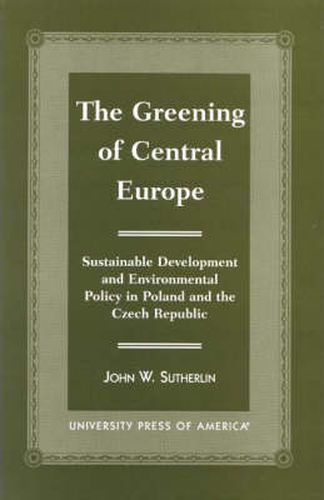Readings Newsletter
Become a Readings Member to make your shopping experience even easier.
Sign in or sign up for free!
You’re not far away from qualifying for FREE standard shipping within Australia
You’ve qualified for FREE standard shipping within Australia
The cart is loading…






The Greening of Central Europe evaluates the environmental policies of Central Europe, using Poland and the Czech Republic as examples. John W. Sutherlin recognizes that since the Earth Summit II meeting in Rio de Janeiro in 1992, most states have attempted to incorporate the principles of sustainable development into their national environmental and economic management policies, in turn leading to less pollution and more favorable economic conditions in the long term. However, achieving this goal in the states that emerged from Soviet domination would seem nearly impossible. So Sutherlin portrays the political changes in Poland and the Czech Republic as a foundation for understanding the formation of environmental policy. He then summarizes how well each state has incorporated the principles of sustainable development into their policy-making systems. Finally, he evaluates various environmental measurements, including air quality, deforestation, and public health, to assess the successes and failures of each state. His conclusions provide a mixed result for sustainable development, especially for the transitional states in Central Europe, yet the evidence shows that the greening of central Europe has begun.
$9.00 standard shipping within Australia
FREE standard shipping within Australia for orders over $100.00
Express & International shipping calculated at checkout
The Greening of Central Europe evaluates the environmental policies of Central Europe, using Poland and the Czech Republic as examples. John W. Sutherlin recognizes that since the Earth Summit II meeting in Rio de Janeiro in 1992, most states have attempted to incorporate the principles of sustainable development into their national environmental and economic management policies, in turn leading to less pollution and more favorable economic conditions in the long term. However, achieving this goal in the states that emerged from Soviet domination would seem nearly impossible. So Sutherlin portrays the political changes in Poland and the Czech Republic as a foundation for understanding the formation of environmental policy. He then summarizes how well each state has incorporated the principles of sustainable development into their policy-making systems. Finally, he evaluates various environmental measurements, including air quality, deforestation, and public health, to assess the successes and failures of each state. His conclusions provide a mixed result for sustainable development, especially for the transitional states in Central Europe, yet the evidence shows that the greening of central Europe has begun.